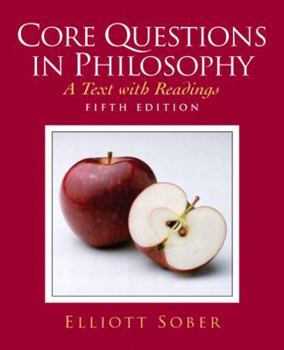Core Questions in Philosophy: A Text with Readings
Select Format
Select Condition 
Book Overview
Writing in an engaging lecture-style format, Elliott Sober shows students how philosophy is best used to evaluate many different kinds of arguments and to construct sound theories. Well-known... This description may be from another edition of this product.
Format:Paperback
Language:English
ISBN:0132437783
ISBN13:9780132437783
Release Date:March 2008
Publisher:Pearson Prentice Hall
Length:542 Pages
Weight:1.68 lbs.
Dimensions:1.2" x 7.0" x 9.1"
Customer Reviews
3 ratings
Dude, it's core questions, and there's, like, an apple core!
Published by Thriftbooks.com User , 20 years ago
My philosophy teacher brought that up, and our class snickered cynically. "Snickered cynically" - is that college kids for you, or what? Hey, maybe I (a college kid myself) am being cynical now. Touchez?? Seriously, this book is a great introduction to philosophical problems. The contents are divided into four major sections, aside from a brief section introducing the reader to deductive, inductive, and abductive arguments: 1). arguments for and against the existence of God, 2). Can we really know anything, and if so, how do we know it?, 3). How is the mind related to the body, and do we have free will?, and 4). Ethics. Sober takes an essentially unbiased approach to all arguments for and against each perspective concerning each topic. There are arguably exceptions, however - for instance, I received a hint of bias from Sober toward a functionalist/identity theorist account of mind and brain (although he did admit there seems to be something special about conscious experience, or "what it's like," that this type of explanation doesn't account for). Also, Sober is clearly against subjectivism in ethics (and I totally agree with him, here). I think Sober's explanations of some concepts are more laborious than they need to be. I don't mean to sound flip, but I typed up a study guide (in complete sentences and paragraphs, mind you) in which I summarized between 50-60 pages of Sober's section on ethics into a nice 10-page, 12-font, single-spaced, packet. I'm surprised Sober didn't devote any space for a lecture on consciousnes (i.e. qualia, etc.) in the section on philosophy of mind. This is easily one of the more difficult, and unresolved problems for scientists - I'd assume philosophers are still talking about it, too. If you're interested in some philosophical issues, and aren't taking a university course for which a broadly-scoped textbook like this is mandatory, then you're likely going to want to seek out information more specified to your particular area of interest (i.e. philosophy of mind). However, if you'd like a basic "lay of the land" concerning the general questions modern philosophers explore, and the methods with which they attempt to do so, then this book is a welcome read.
Introduction to Philosophy
Published by Thriftbooks.com User , 23 years ago
Divided into five sections: Introduction (which explains methods of philosophical argument), Philosophy of Religion, Theory of Knowledge, Philosophy of Mind and Ethics. Each section explains the topic and gives various standpoints that have been taken, often with reference to the included bite-size excerpts (normally about 10 pages) of important writings by famous philosophers.It is accessible to complete beginners, and makes the subject of philosophy much less dautning. The readings are convenient, and save you having to read through a philsopher's entire writing to get to the important bits.The problems are 1. Sober sways readers to his own opinions on arguments that are far from conclusive. 2. He introduces his own terms - The 'Surprise Principle' and 'The Only Game in Town Fallacy' - Better if he used terms that are more widely accepted. 3. It is called 'Core Questions', but it is questionable whether either the issues of religion or the mind are questions in philosophy at all anymore, or if the former is part of theology and the latter science.Still, useful introduction and more interesting and modern than the usual chronological introductions, like Copleston or Russell
anthology and textbook, all in one
Published by Thriftbooks.com User , 25 years ago
Sober, an influential philosopher of biology and science at UW-Madison, offers a clear and intelligible introduction to philosophy in this book. Chapters on religion, ethics, epistemology, metaphysics et al., are all remarkably clear and cogently argued.Just as valuable as Sober's lucid lectures are the sections of primary text that he liberally excerpts. Generous portions of Sartre, Plato, Descartes, and Mill make this text a good way to get a feel not only for the questions philosophers face, but the enormously varied styles with which they have approached and written about them.






